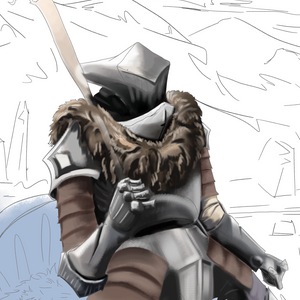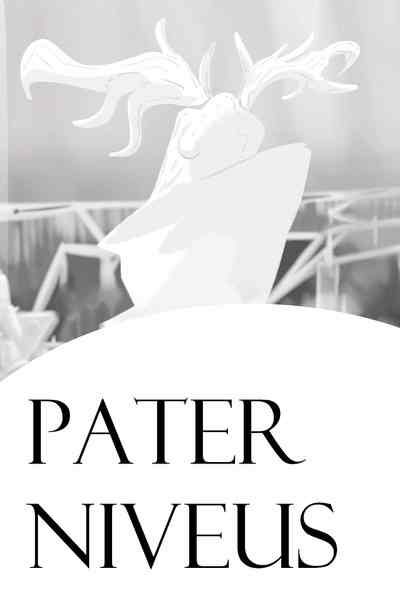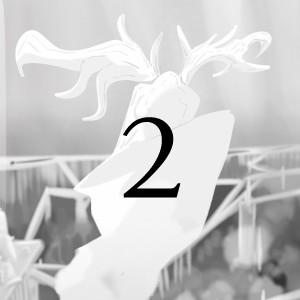- Chapter 2
The bleak, snow-covered city surrounding the red city centre was natural for Annemarie. This did not mean she wasn’t interested in the landscape's origins. “It is a wasteland made of abandoned buildings,” Annemarie read. “'A husk of human civilisation,’ one historian of the first generation to witness the endless winter famously said,” she tried to continue the book, but Annemarie had never seen the civilisation this historian proclaimed. With a grumble of confusion, she returned the textbook to the bookshelves of the school library. She struggled to get past the first page again. She murmured to herself disappointedly and looked for another book to read. Although she previously said loudly, “picture books were for babies,” she had to concede to the wordiness of the previous history books. She conceded to reason and this time she searched for a book with as many pictures as reasonably possible.
It was hard to admit, but she liked illustrations of nature and past house life. It wasn't as useful as the mathematical and detailed blueprints she had found on her parents work desks and she felt so childish and improper. She didn’t want to be coddled, but it was apparent that she couldn’t read proper things yet. “There!” she thought as she found something interesting, a past pupil's presentation notes. Those were always helpful Annemarie though. Those never felt like she was treated like a baby, nor like she knew all these things, whatever they were.
She looked at the clock and knew she had to hurry. Annemarie quickly borrowed the notes properly and packed her school bag. Her mother was home today, and she was late. She hurried past a tired clerk who had already been cleaning the floor for the next day. No other children had remained in the school building for as long as she had. It was her special situation that had caused this otherwise unhealthy habit of hers. While other children played in the early afternoon hours before it was too late, Annemarie had to stay at school a little longer. Because of this, she was often tempted to remain even longer at school and search for interesting reading material. She had always use for those during the evening. Waited for her parents to come home often.
Her teacher was at fault too. Originally Annemarie was staying a little longer at school so her teacher could check up on open questions Annemarie had because she skipped a grade, but they often got side-tracked and ended up in interesting discussions until it was late. Today her teacher had known that Annemarie’s mother was home, but Annemarie had asked too many questions. They ended up in a discussion on the nature of the world. After this Annemarie wanted to take up some more reading material and the teacher took Annemarie to the school library. Left to her own devices Annemarie completely forgot the time and searched for some more books.
Annemarie didn’t feel like it was her teacher's fault, but she knew her father would be arguing with her teacher if she lost any more time. Thus, Annemarie sped out of the school walked straight through the red-bricked marketplace. Its warmth flowed into her as a slight wind pushed hot steam from the stalls into the road.
Even in the early evening, the town centre was bustling with life. It didn't matter if the sun disappeared behind the grey clouds and the abandoned skyline of the buried city part. The people of the red-bricked marketplace would keep up by heating their houses and stalls. They fed their fires and generators with vigour and will to defy the encroaching cold. Annemarie dreamed of how they were one big organism lifting and melting the weighty snow, and how awesome her parents were.
She was reaching the other side of the marketplace as she started smelling a particular taste, roasted chestnuts. She had to return home quickly, but it wouldn’t take her too long and it was just as important for an enjoyable evening, she was sure of it.
Annemarie turned around the corner of a stall and walked down a less busy slice of the centre. It was in the direction of the elderly’s housings from which fewer people came. As fewer people passed through the road, fewer steps crushed the snow which laid on the ground. Together with the falling temperature, the diminishing sunlight and the lack of big stalls, there was a slight layer of snow. Of course, Annemarie didn’t mind, she had come here often, and she liked the crunching sound it made under her boots. She thought it was a lovely sound. For her, it was like an act of personal revenge against the endless cold.
As she drew to the border of this side of the circular marketplace, she found what she was searching for. There, under the extended porch of the front-most building, an old man sat at a little stall, which was no more than a table and a comfortable rocking chair. He was known to the children as the chestnut man. Annemarie was a little embarrassed that she forgot this neighbourhood uncle’s name, but he didn’t seem bothered. He had been the chestnut vendor for a long time and had come to like the personae of the roasted chestnut man.
Annemarie strolled through the last few paces towards the old chestnut vendor and arrived in front of a booth she knew well.
“Hullo,” she said and the vendor in a lovely green coat replied in turn.
“A bag of chestnuts I suppose?” the chestnut vendor asked in a playful tone, “small bag or a big bag?”
“A big bag for a big girl,” Annemarie answers joyfully. She was eleven years soon.
“Oh, I see,” the vendor chimed and handed her the roasted chestnuts. They were in a tube of paper folded in the middle so that it formed two separate bags. One could take a chestnut from the first side and put the peel in the second. The process was entertaining and a good way to pass time. Chestnuts had an aromatic flavour and they tasted even better if one felt cold.
Annemarie loved them because of those properties and hurried away after she had received them. The only problem was that she had problems peeling them with mittens on and that she was late. She should hurry more, and so she walked as fast as she could without breaking into a run. She had learned that one shouldn’t run around the marketplace where you could hurt yourself on hard edges or run into unsuspecting pedestrians. She strode on the curved edge of the marketplace to the short street leading to her home.
Annemarie continued down the street, which would once have been called a two-lane road. Now the road was only used by pedestrians and the hand-drawn cart for heavy deliveries. She passed the first layer of buildings; a backer's shop was at her left and a carpenter on the right. The next ring around the marketplace consisted of more miscellaneous ministries and facilities. And then Annemarie arrived at the third layer, which consisted of living space for most of the newer families.
Years before her birth, the inhabitants of the red centre had been thinking of abandoning their little town. They had thought of venturing outside to other, more adapted communities. But before these plans could be finalized the living conditions had improved. They had renovated most of the central buildings and insulated everything against the cold. As the then young workers, engineers and scientists grew up they needed more space. They decided to reclaimed a wing of then nearly abandoned and buried buildings. These buildings formed this third half circle around the centre.
For once Annemarie could imagine how it would have looked in the near past. The buildings were not excavated completely, and a thick mattress of snow pressed up against the back of her home. The back door was completely stuck, and she was told many times to never open the back facing windows. She knew not to, as a freezing draft always pushed through the empty roads outside of the red-bricked centre. And the short two-laned road would go on for far longer than she could see if the fat mattress of snow didn’t spill into the street. This slowly flowing white wave formed a tall ramp about a story tall at the tip of the road, where it passed through the third layer, into what would be called the fourth, if it was not abandoned.
This ramp couldn’t be cleared. There was a massive supply of snow that replaced what little bits any clerk or worker shovelled away at the bottom of it. Thus, it had become a landmark.
“Here, take this!” a child yelled with glee as it threw a snowball at another. The latter replied in kind and kicked up a cloud of snow.
Further up on the ramp another child yelled, “watch out!” as it slid down the mound of snow. Some adventurous children climbed even further up the mountain of snow but always made sure to keep to the side pointing inwards, towards the red-bricked marketplace. The fear of falling into the deep snow on the other side of the protective wall of red-bricked buildings was instilled in everybody from an early age on. It was a simple rule to never stray out of sight of the inhabited area. Annemarie followed it even more strictly. Her mother told her not to try to climb the ramp of snow and Annemarie agreed. It was dangerous and although it sure looked fun, it was better to follow her parents' advice.
Annemarie felt at home as she watched the other children having fun and felt bitter as she couldn’t play now. She was in two minds. She had looked forward to meeting her mother again after a few days, but Annemarie had been cooped up in the school library and at home for far too long the last days. She sighed; she couldn’t change anything now. She decided that she just had to do better in the future.
She finished the last few steps to the entrance to her home. It was part of multiple houses linked to each other. From outside it nearly looked claustrophobic as each entrance to another home was only half a dozen paces from the next, but inside the rooms were just right. Each home stretched further back into the building than one would expect, and Annemarie was still astonished by how the living room, kitchen and bath fit in one floor.
Just as she finished making imprints on the snow and walked onto the porch, she was noticed by the playing children. “Hey, Annie, why don’t you play with us!” the children who saw her chimed at her back.
“Maybe later, I have homework,” Annemarie answered after she turned around. She wanted to join but couldn’t. It was at it was. She didn’t just want to study but needed to if she wanted to follow her parents as fast as possible.
“Can’t you do your homework later?” the children asked again with expectations.
“No, I can’t,” Annemarie explained herself, “my mother has been waiting for me.” The children voiced their dissatisfaction, but they understood. Some of their parents worked a lot too.












Comments (1)
See all